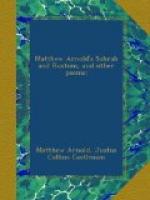=Arnold as a Lyricist=.—Lyric poetry is the artistic expression of the poet’s individual sentiments and emotions, hence it is subjective. The action is usually vapid, the verse musical, the time quick. Unlike the Epic and Drama, it has no preferred verse or meter, but leaves the poet free to choose or invent appropriate forms. In this species of verse Arnold was not wholly at ease. As has been said, one searches in vain through the whole course of his poetry for a blithe, musical, gay or serious, offhand poem, the true lyric kind. The reason for this is soon discovered. Obviously, it lies in the fundamental qualities of the poet’s mind and temperament. Though by no means lacking in emotional sensibility, Arnold was too intellectually self-conscious to be carried away by the impulsiveness common to the lyrical moods. With him the intellect was always master; the emotions, subordinate. With the lyricist, the order is, in the main, at least, reversed. The poet throws off intellectual restraint, and “lets his illumined being o’errun” with music and song. This Arnold could not or would not do. Then, too, Arnold’s lyrics are often at fault metrically. This, combined with frequent questionable rhymes, argues a not too discriminating poetical ear. He also lacked genius in inventing verse forms, and hence found himself under the necessity of employing or adapting those already in use. In this respect he was notably inferior to Tennyson, many of whose measures are wholly his own. Again, considerable portions of his lyric verse consist merely of prose, cut into lines of different length, in imitation of the unrhymed measures of the Greek poet, Pindar. The Bishop of Derry, commenting on these rhythmic novelties, likens them to the sound of a stick drawn by a city gamin sharply across the area railings,—a not inapt comparison. That they were not always successful, witness the following stanza from Merope:—
“Thou confessest the prize
In the rushing, blundering, mad,
Cloud-enveloped, obscure,
Unapplauded, unsung
Race of Calamity, mine!”
Surely this is but the baldest prose. At intervals, however, Arnold was nobly lyrical, and strangely, too, at times, in those same uneven measures in which are found his most signal failures—the unrhymed Pindaric. Philomela written in this style is one of the most exquisite bits of verse in the language. As one critic has put it, “It ought to be written in silver and bound in gold.” In urbanity of phrase and in depth of genuine pathos it is unsurpassed and shows Arnold at his best. Rugby Chapel, The Youth of Nature, The Youth of Man, and A Dream are good examples of his longer efforts in this verse form. In the more common lyric measures, Arnold was, at times, equally successful. Saintsbury, commenting on Requiescat, says that the poet has “here achieved the triple union of simplicity, pathos, and (in the best sense) elegance”; and




